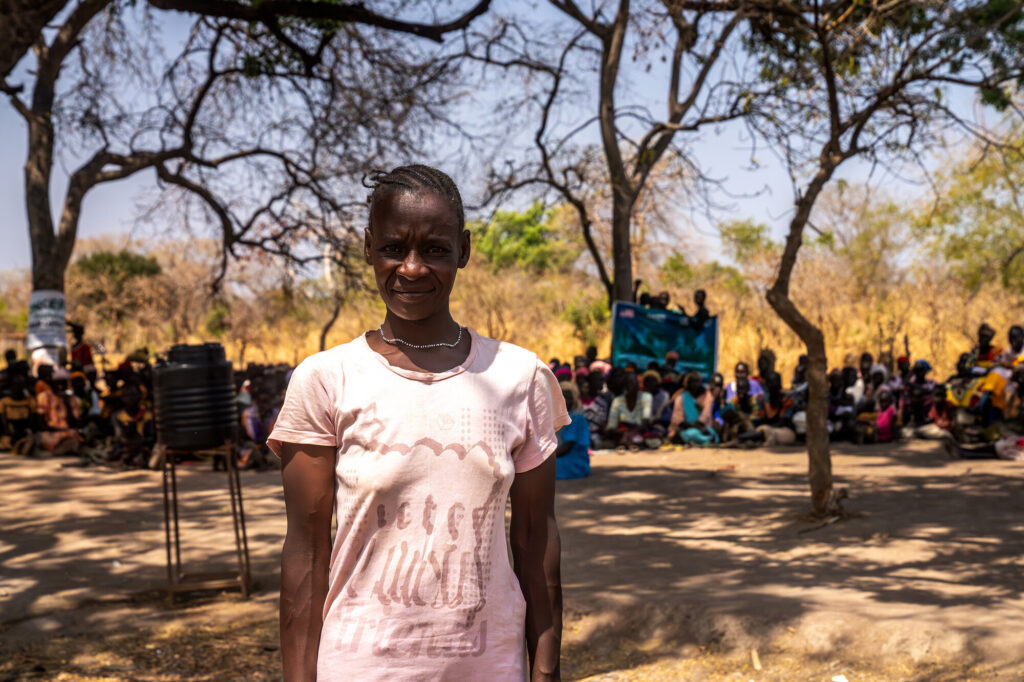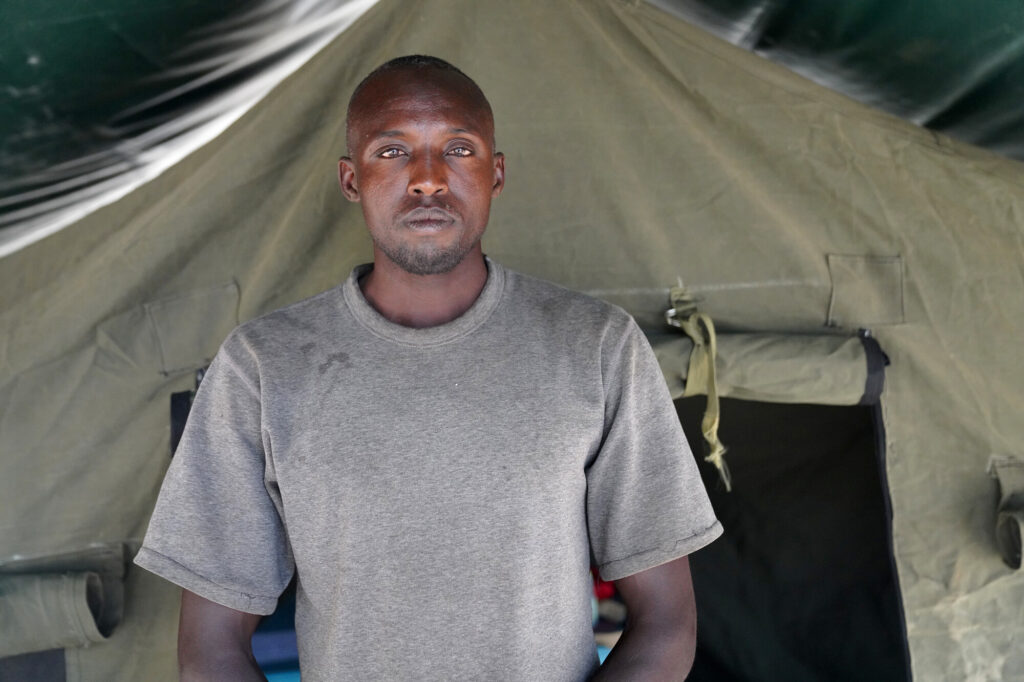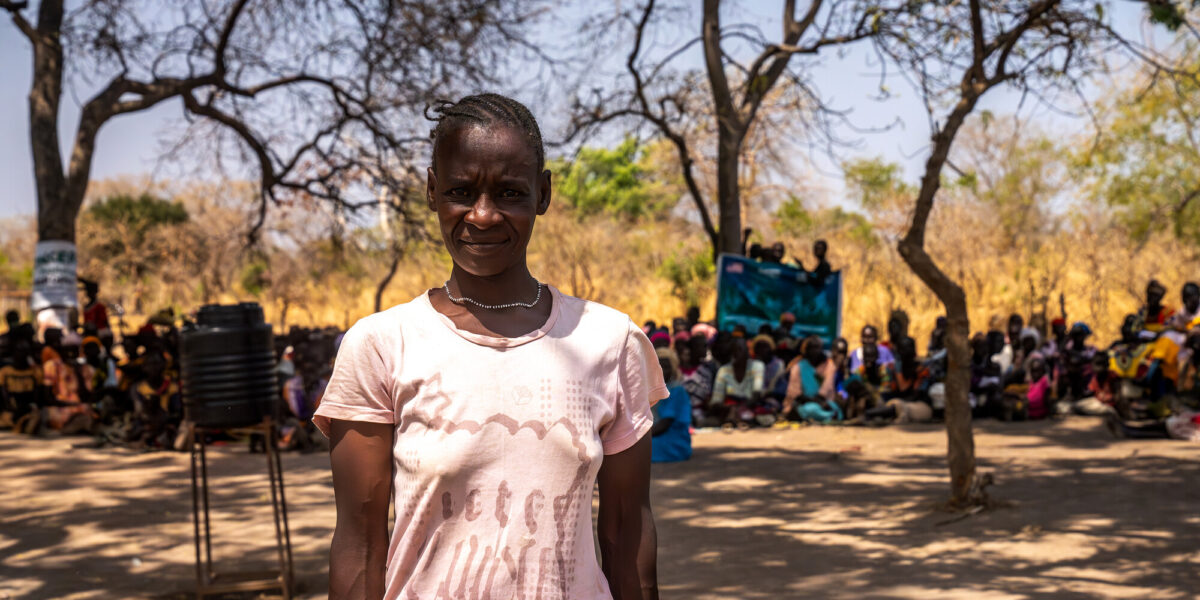The world’s largest humanitarian crisis is currently occurring in Sudan and its neighbouring countries.
The numbers are off the charts – 30 million in need of humanitarian need, over 11 million forced from their homes, disease and hunger rates soaring, with famine declared in parts of the country.
But the numbers hide the true scale of the suffering. You get a glimpse of the heart-breaking trauma and suffering when you meet those who had fled the conflict and are seeking refuge in neighbouring South Sudan.
Atong Garang* sits on the end of the camp bed in the cholera tent at Concern’s health facility at Malek Miir, a few kilometres from the border crossing with Sudan. The large white tent is surrounded by red and white tape to keep away others who are using the health facility. Lying beside her on the bed is her daughter Sarah (10)*.

She became unwell the previous day, with fever, vomiting, watery diarrhea and stomach pains. Atong is hopeful that her daughter will recover. Sarah is the fourth of her nine children. Atong fled to Sudan for safety during the civil war in South Sudan between 2013 and 2018. Now she is fleeing conflict again, this time returning to her home country.
When the fighting began in Sudan in April 2023 she left. “It was dangerous on the way,” she explains. Armed groups took property from them along the route. She finally crossed the border into South Sudan at Kiir Adem with nothing. Severe flooding last year also destroyed the crops she had been growing in a small kitchen garden. “I have nothing” she repeats.
Sarah is one of 170 cholera cases treated over a six week period at the Concern facility since February. The numbers are rising dramatically – two new cases were admitted the morning we visited. Across South Sudan there were over 44,300 cases of cholera between September and early April, accounting for over 800 deaths.
A few kilometres away a wrought iron bridge crosses the Kiir river which marks the border with Sudan. Over 22,000 people have crossed this bridge into South Sudan since the conflict erupted almost two years ago.
A trickle of people arrive on the morning we visit. Cattle and donkeys drink along the banks, egrets hunt for lunch in the reeds and local people are waist deep casting fishing nets.
Despite the idyllic setting, the river is at the heart of the cholera outbreak in the local community. There are just two wells for the local population of 10,000, which has been swollen since the conflict began in Sudan. There are no latrines. People are left with no choice but to drink the river water.
Unless they can control the spread of cholera now, during the dry season, the number of cases will soar when the rains arrive in May, Concern’s health and nutrition projects officer Santino Bol said. If that happens “almost every household will be effected” he warned.
Concern is working to provide a further five wells in the area and, in the mean time, are distributing water purification tablets and urging people to boil water before drinking it.
In addition to cholera, health workers at the border community are busy treating diseases such as malaria, diarrhoea and pneumonia. Malnutrition had been an issue for the local community before the latest conflict. But malnutrition rates have soared since then, with 24% of those screened as they crossed into South Sudan malnourished.
Children are screened for malnutrition and vaccinated at the mobile clinic at the border. For most, they are provided with specialist therapeutic food. But the sickest are transferred to a stabilisation centre about an hour’s drive away at Gok Machar.
Many of the children treated here are malnourished but also suffer from complications as a result of also having malaria or TB, explains Concern nurse Isacc Garang. They usually treat children for between seven and 14 days before they are discharged. But some of the sickest children need three months treatment.
Amiema Jocep* is at the clinic with daughter Aluth (nine months) who is frighteningly thin. The baby’s twin died on the way to the clinic. Aluth is breathing shallow, fast breaths as she lies on the bed. She had constant fever, wasn’t growing, had stomach problems and had lost her appetite, her mother explained. “I have hope she will get treatment here,” she adds.

Many of those who have crossed from Sudan, have experienced traumatic, terrifying journeys fleeing the conflict which is raging across the country. Concern’s teams are providing psycho social support. Those seeking support include people who have experienced gender based violence, people who witnessed violent deaths or the death of a child, explains Concern social worker Rebecca Atang Deng. “Others are traumatised by poverty – if they cannot provide three meals a day to their family” she added.
She provides support for people from the privacy of a small tent which is part of a mobile clinic operating from the welcome shade of a huge mahogany tree at Athiam.
Anyang Biar* (28) fled the Sudanese capital, Khartoum, in May 2024 with her three children, aged from six years to 16 months old. Her mother and father were killed in the conflict and her brother and sister were burnt to death in a house. It took eight days to drive the 1,000 kilometre journey to safety in South Sudan. The trip was dangerous, with armed groups stealing her property. But fortunately she was not physically harmed. In Sudan prior to the conflict life was good, she reflects. She had a job and was living with her parents. “Now I have nothing,” Anyang says.

Student Luol al Bhaib* (30), watched his brother being shot dead in front of him. His family lost their cattle and their shop in the war. “People were killing and stealing and threatening,” he recalled. “We decided immediately to come to South Sudan.” Many people did likewise.

Luol undertook a terrifying two week journey by truck from the Darfur region to reach South Sudan. They were beaten by those they met on the way. “We were very afraid, we did not sleep,” he said.
His mother, brother and his brother’s family are still in Sudan. “I am trying to find a way to get them out,” he explained. It has been two or three months since he last had contact with them. In meantime he hopes to find work in South Sudan to enable him to support them.
Others camped near the Sudan border are fleeing more horrific experiences. Concern social worker Robert Akol Garang provides psycho social support from a small tent at Concern’s mobile clinic at Kiir Adem. Many of the women he sees have arrived from Sudan are traumatised, having experienced emotional or physical violence.
Many have also experienced gender based violence. Those seeking support include adolescent girls and boys. The youngest person Robert has supported was 14 years old. Survivors recount about being raped, sexually assaulted, beaten, kicked, shot, stabbed and burnt with acid. Others have had their faces cut by their attackers.
An insight into the scale of the violence currently being experienced by ordinary people in Sudan is that the fact that at the small psycho social support tent at Concern’s clinic on the banks of the Kiir river, Robert assists about 150 people a week.
And this is just a snap shot from one small community. That suffering and need for humanitarian assistance along the South Sudan/Sudan border is replicated on a vast scale within Sudan and in neighbouring countries which are hosting those displaced.
Author: Concern Worldwide.
*Names have been changed to protect identity of interviewees.


